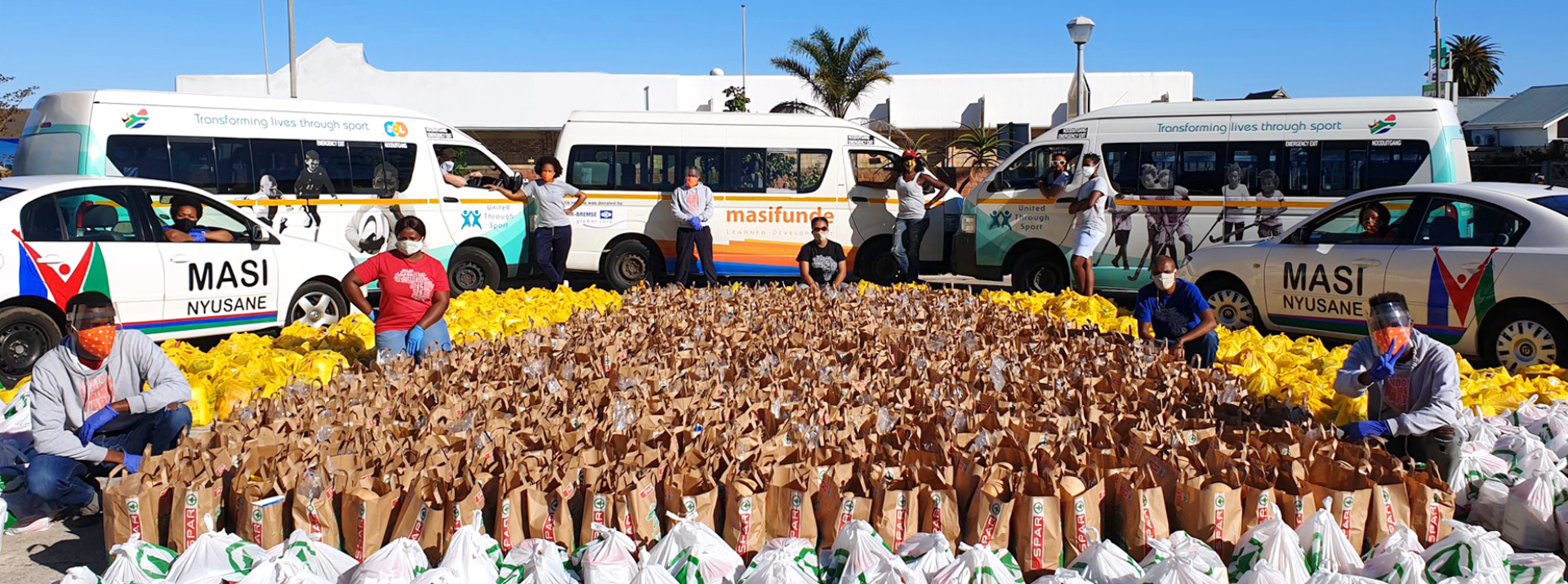
Food parcels for Walmer Township in South Africa, a community that benefits from the Masifunde education project. © Masifunde
The Covid-19 pandemic presents serious difficulties for aid organizations and projects. Funding for NGOs is on the line and, in some cases, the valuable work they have been doing for years is now at risk of collapsing. Knorr-Bremse Global Care is supporting people affected by the pandemic and pressing ahead with education and WASH projects.
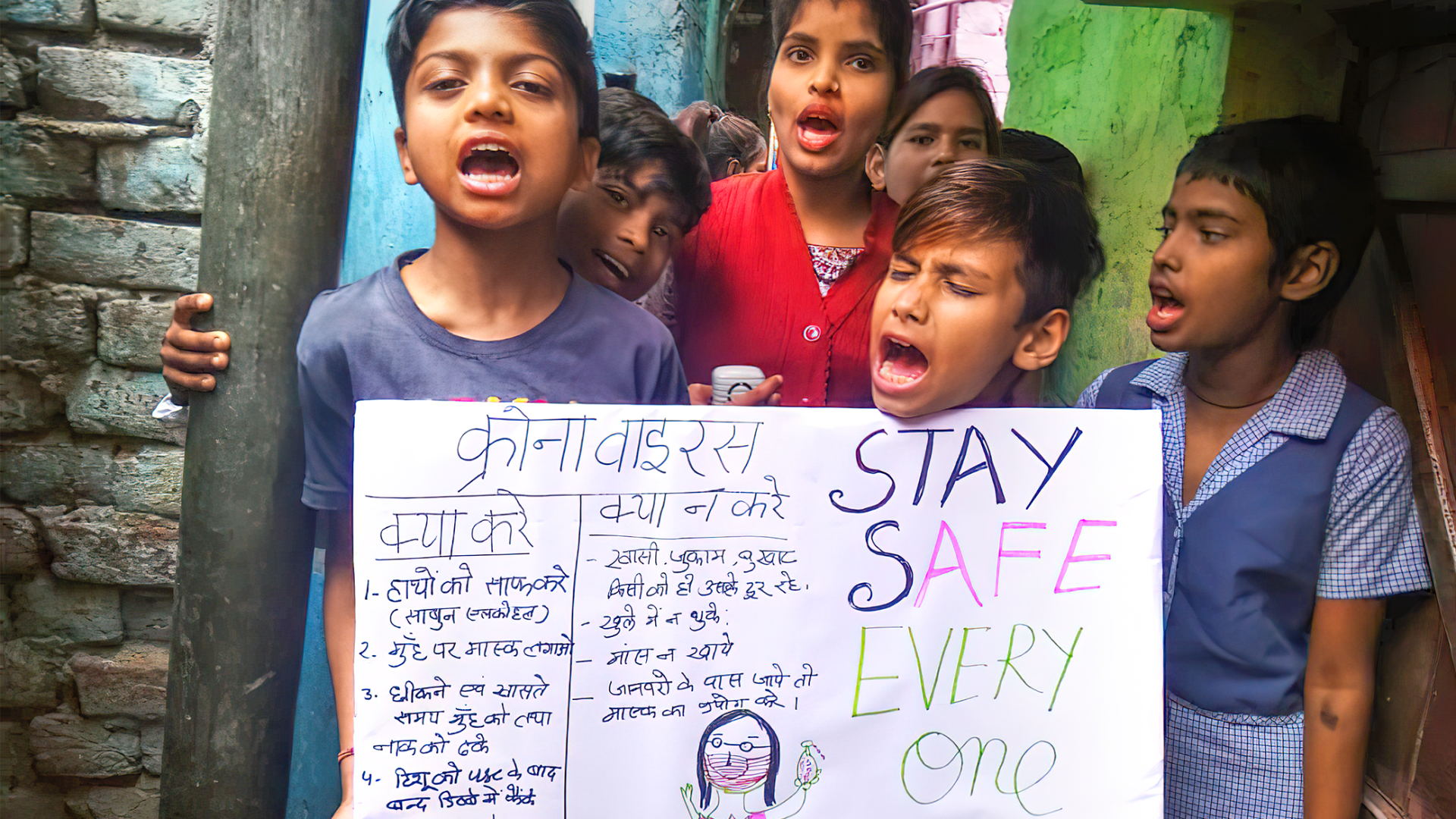
Poverty and hunger are on the rise. The proportion of people living in extreme poverty, which had been falling globally for years, rose again in 2020, fueled by the Covid-19 virus and its social and economic consequences. The resulting nutritional deficiencies are weakening people physically, while a lack of sanitation and inadequate water supplies provide a breeding ground for disease. In this situation of social and economic hardship, many families are driven to choose child labor over education. Even in industrialized nations, young people are among the pandemic’s losers. Home schooling widens the education gap for disadvantaged groups in society who do not have the technology they need to take part in online learning.
As Julia Thiele-Schürhoff, Chair of the Executive Board of Knorr-Bremse Global Care explains, Global Care has responded to these challenges: “In 2020, we deployed our emergency relief funds exclusively for Covid-19 relief projects. Most of the money went to support ongoing Global Care projects or our long-term partner organizations. The aim of our Covid-19 relief measures was to ensure a rapid and real improvement in the situation of those affected.” In addition, shortterm Covid-19 assis- tance, such as financial and in-kind donations, was provided by Local Care, the organization that coordinates community projects at Knorr-Bremse sites.
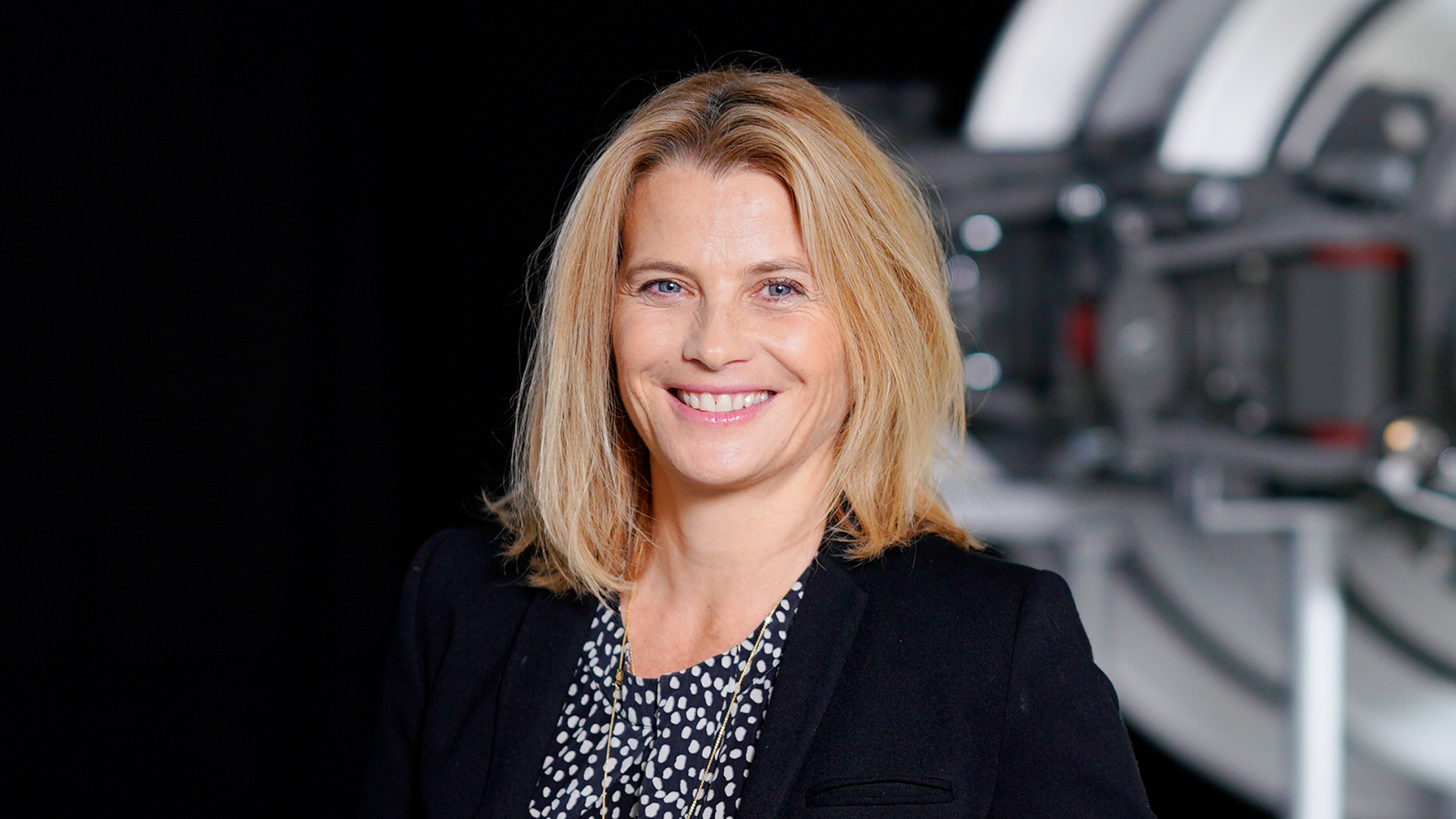
The aim of the Covid-19 relief measures was to ensure a rapid and real improvement in the situation of those affected.
Julia Thiele Schürhoff – Chair of the Executive Board of Knorr-Bremse Global Care
Emergency relief, education, WASH
Knorr-Bremse Global Care’s origins lie in emergency relief. The organization was set up immediately after the tsunami that devastated South-East Asia in December 2004. At the time, the aim was to provide assistance to the victims quickly and efficiently. In the past 15 years, around 850,000 people have benefited from the work of Knorr-Bremse Global Care as the organization has continued to structure its support and objectives. Some of the rapid assistance provided in the year of the pandemic enabled partners to continue their work in the key support areas of education and WASH (water, saniation and hygiene). In 2020, Knorr-Bremse Global Care firmed up its objectives in these two areas, which are aligned with two of the 17 Sustainable Development Goals (SDGs) of the United Nations: SDG 4 Quality Education and SDG 6 Clean Water and Sanitation.
Knorr-Bremse Global Care around the world
Knorr-Bremse Global Care has a global structure, comprising three regional non-profit organizations: North America (in the USA since 2018), Asia Pacific (in Hong Kong since 2019) and the original organization in Europe (in Munich since 2005). Martyn Perkins of Knorr-Bremse Global Care Asia Pacific describes the importance of the regional structure in terms of Global Care’s activities in India: “Having a local presence enables us to work more closely with our partners Save the Children in Delhi and Work For Equality in Metalwadi near Pune. We get to know the communities we support and the direct beneficiaries of our aid programs in person, and can also maintain a long-term dialogue. This contributes to a very high level of local engagement, not least on the part of the local Knorr-Bremse sites.”
India: Covid-19 emergency relief and WASH project
During the coronavirus crisis, whole families are often seeing their sources of income dry up. Money is tight and younger children are being taken out of school to help earn a living. Aiming to break this cycle, Knorr-Bremse Global Care teamed up with Work for Equality, an NGO in the village of Methalwadi, near Pune in India. During the Covid-19 pandemic, before the start of a WASH project planned for the village, Work for Equality distributed 150 food and aid parcels to struggling villagers with the help of Knorr-Bremse Global Care.
Info
Knorr-Bremse Global Care’s Covid-19 rescue fund
As well as funding educational and WASH programs in 2020, Knorr-Bremse Global Care spent almost EUR 700,000 on measures designed to mitigate the impact of the Covid-19 pandemic. This aid reached more than 90,000 people around the world.
- 56,000 people worldwide received food or food vouchers to prevent them from going hungry
- 30,000 people worldwide attended hygiene awareness and training sessions
- 10,000 children and young people were equipped with devices and internet access to enable them to take part in online lessons
- 14,000 people received health support and hygiene kits
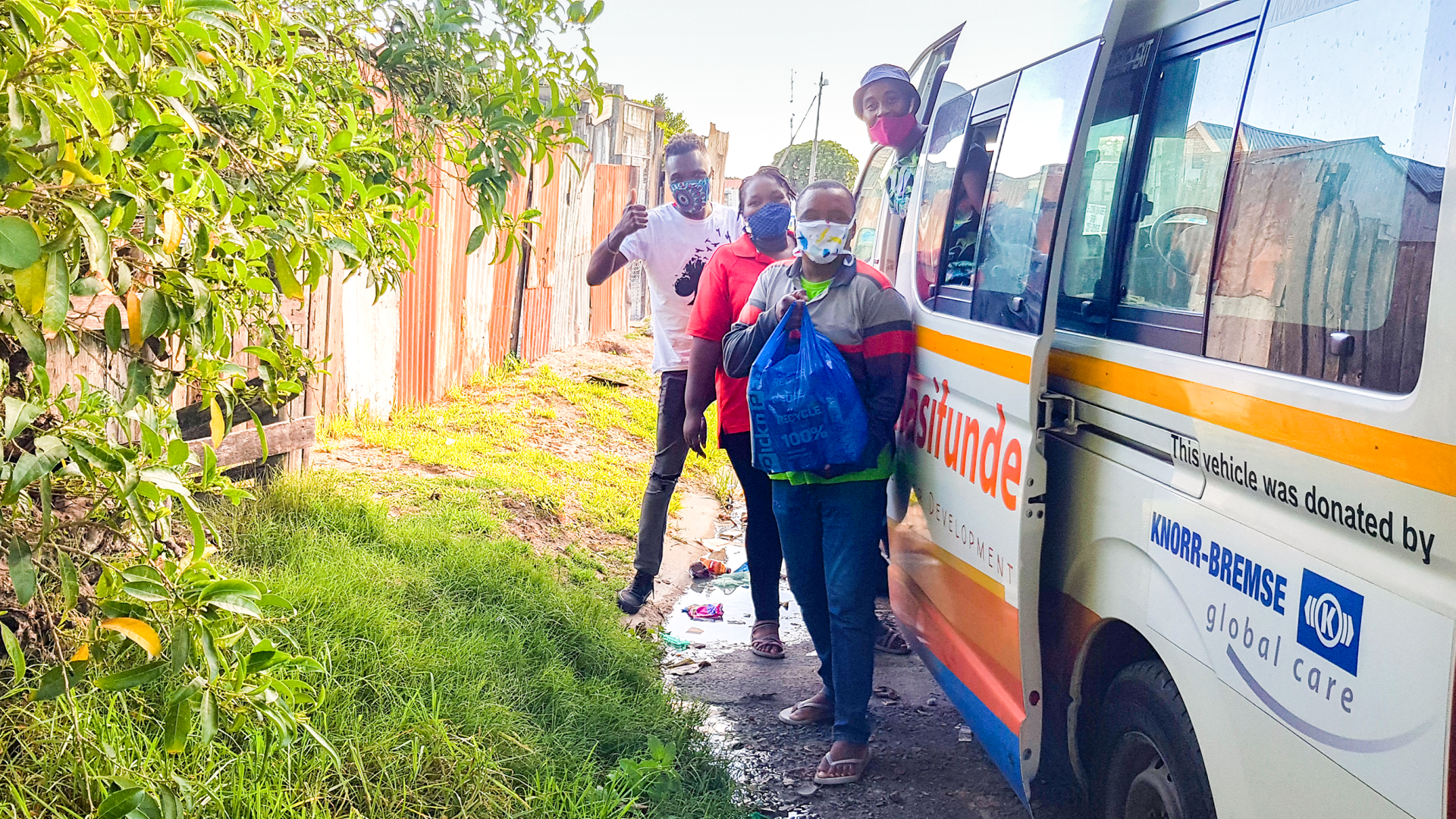
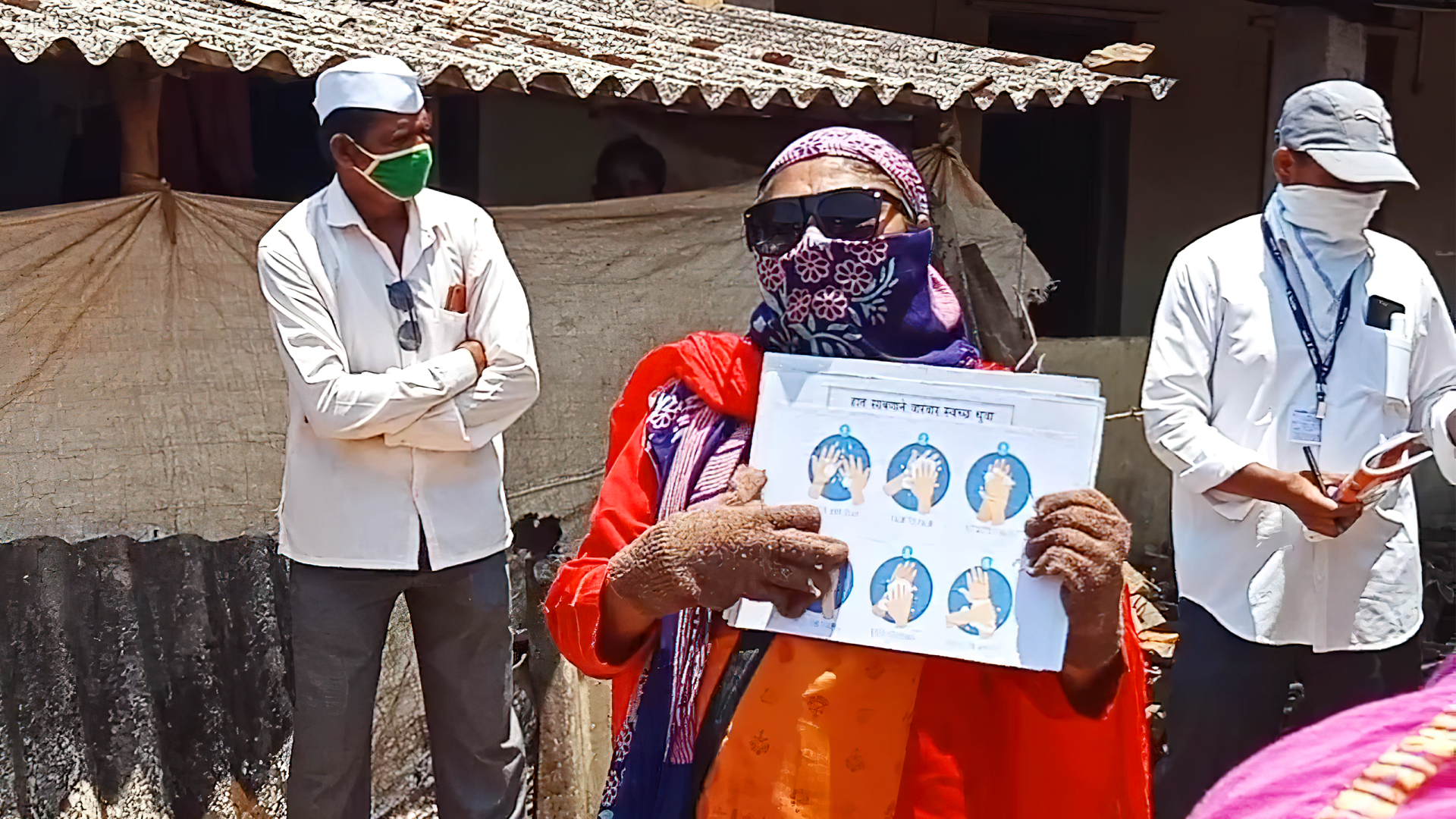
More than 775 children and adults benefited from the donation. A total of 116,250 meals were providedfor the local communities. Prabha Vilas, CEO of Work for Equality, says, “During the distribution, we facilitated awareness sessions for the people and emphasized the importance of following all the WHO guidelines, such as social distancing, proper hand washing and wearing a mask.” Although the Covid situation delayed planned activities, Martyn Perkins of Knorr-Bremse Global Care Asia Pacific says, “The Covid emergency relief program rapidly gave us a better understanding of our new NGO partners.
This closer relationship will benefit the WASH and school project in Metalwadi that we and LocalCare are supporting through various phases.” A WASH program has started in Metalwadi at the beginning of 2021, involving the construction of new toilets and the provision of clean drinking water. This will be followed by a supplementary education program that will be set up to provide further training for the children and young people in the villages.
South Africa: Educational advancement through changemakers
Masifunde, an educational facility in Port Elizabeth in South Africa, is a reliable partner working with town- ship schools. Up to 450 children can take courses therein school subjects or develop their talents. Masifunde trains changemakers - talented young people from Walmer Township who have received support in the past and can then help other children in the community improve their skills, education and job prospects, thereby bringing about real change in the community. Knorr-Bremse Global Care has been involved with the Masifunde project since 2008.
Germany: Bridging the online learning gap
“Education is the most important asset in a modern economy,” says Frederik Kronthaler, Head of Youth Welfare at Condrobs in Munich. “And it is the only way of giving children from all walks of life the same opportunities and the same level of participation in public life.” The importance of digital access for education and work has risen sharply with Covid-19 and the resulting social distancing rules – both for adults working from home and for children being home schooled. Not every fam- ily is in a position to keep up with the requirements. Knorr-Bremse’s donation of 23 second-hand laptops for Condrobs has enabled children and young people in the Messestadt Riem project (PMR) to participate fully in lessons again. This is particularly important for secondary school students who are about to take their final exams. Condrobs is an aid organization that offers individual solutions, paving the way for people to live self-determined, healthy lives. Knorr-Bremse Global Care provided additional support in 2020 with a financial donation to pay for food, second-hand smartphones and pay-as-you-go SIM cards.
Info
A strategy that targets maximum impact
Knorr-Bremse Global Care’s strategy is built around the systematic deployment of resources, the high effectiveness of WASH and educational activities with newly firmed-up objectives, and the expansion of strategic partnerships.
Education: The goal in the field of education is to provide young people with better access to further education. As Knorr-Bremse Global Care sees it, vocational training and better employment opportunities are key to improving people’s lives. Knorr-Bremse Global Care wants to help reduce levels of youth unemployment and offer disadvantaged people the opportunity to shape their own lives and prospects.
WASH: Commitment to WASH is designed to help reduce morbidity and mortality rates associated with water-borne diseases. The projects we support therefore focus on secure supplies of drinking water and improved sanitation and hygiene. To succeed in the long-term, WASH projects must necessarily involve the local communities and strengthen their sense of ownership, be it through training measures or by creating jobs.
Strategic partnerships: In 2020, Knorr-Bremse Global Care decided to enter into strategic partnerships with selected and proven partners. The idea is to boost the impact of activities by focusing on fewer projects. Engaging in targeted, lasting partnerships not only benefits the project partners, who can take a long-term approach to planning their work: It also enables us to generate greater identification with the projects we support, both among our employees and in the communities where our plants are based. In addition, long-term commitments facilitate better reporting and more effective impact analysis.